Suave singing star Georges Guétary (1915-1997) performed on the London and Broadway stages, but the light tenor achieved his greatest renown in France, where he had a musical career of nearly 60 years. To international cinema audiences, he is best known as Gene Kelly's rival for the affections of Leslie Caron in An American in Paris (1951).

French postcard by Edition d'Art BelFrance, Paris, no. 913. Photo: Sirius / Gaumont, Paris. Georges Guétary in Le Cavalier noir/The Black Cavalier (Gilles Grangier, 1945).
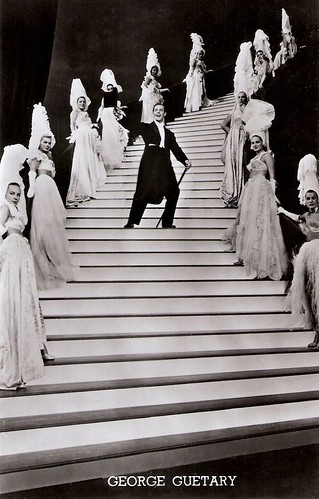
French postcard. Georges Guétary in An American In Paris (Vincente Minnelli, 1951).

French postcard by Edition d'Art BelFrance, Paris, no. 913. Photo: Sirius / Gaumont, Paris. Georges Guétary in Le Cavalier noir/The Black Cavalier (Gilles Grangier, 1945).

French postcard. Georges Guétary in An American In Paris (Vincente Minnelli, 1951).
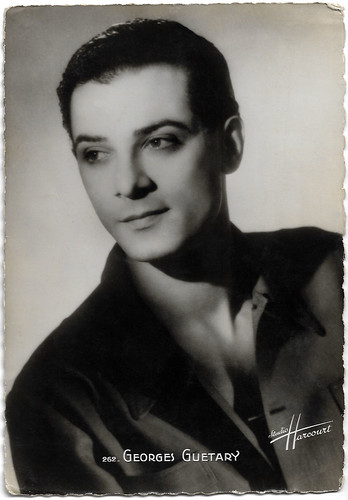
French postcard by S.E.R.P., Paris, no. 262. Photo: Studio Harcourt.

French postcard by Editions P.I., Paris, no. 457.

French postcard by IPB. Photo: Disques Pathé.
Phosphorescently brilliant smile and velvety voice
Georges Guétary was born Lambros Worloou, to Greek parents in 1915 in Alexandria, Egypt. His father was a figure in the textile industry and intended his son to follow in his footsteps. His uncle however was the classical pianist Tasso Janopoulo, who was an accompanist to such violinists as Fritz Kreisler, Jascha Heifetz, and Yehudi Menuhin. Through his influence, Lambros went to Paris in 1934, where his father hoped that he would further his knowledge of commercial procedures.
Instead, Lambros studied music and voice. Humming a song in the office of a concert organiser while on an errand for his teacher, he was asked to audition, he recounted in his memoirs, and left with a one-night singing contract. He became the singer in the orchestra of Jo Bouillon. Not long after making his first stage appearance in 1937, his career took off when he was discovered by Henri Varna, director of the Casino de Paris and became there the singing partner of the music hall queen Mistinguett.
James Kirkup at The Independent offers a different version: "he was 'discovered' one night by the eagle-eyed Mistinguett, who fell for his dimpled smile's almost phosphorescent brilliance, and for his velvety voice. He started appearing as her cavalier at the Casino de Paris in 1938, and was an immediate popular success."
That year he also made his first film appearance in the musical Quand le cœur chante/When the Heart Sings (Bernard Roland, 1938). In 1942 he changed his Greek name to Georges Guétary because German occupiers in wartime France were sending enemy nationals to concentration camps. When he worked in Toulouse as a Maitre d’Hotel, he met the accordionist Fredo Gardoni who engaged him as a singer and let him make his first record.
Another important meeting was the one with Basque composer Francis Lopez in 1943. Lopez created the chansons 'Caballero' and 'Robin des Bois' for him, which became huge successes. During the liberation, everybody sang his song 'A Honolulu' (1945), also written by Lopez. That same year Georges Guétary also appeared in the film Le Cavalier noir/The Black Cavalier (Gilles Grangier, 1945) in which he again interpreted many songs by Francis Lopez: 'Cavalier', 'Avec l'amour', 'La plus belle', and especially 'Chic à Chiquito', another enormous success. His next film, Les Aventures de Casanova/Loves of Casanova (Jean Boyer, 1946), was also a smash hit.
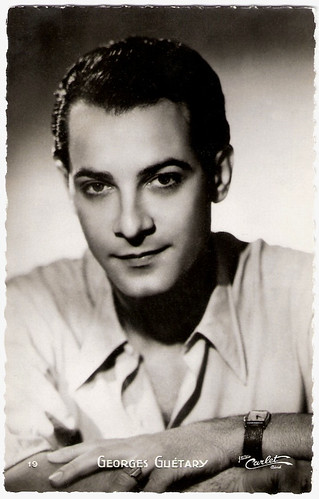
French postcard by Editions P.I., Paris, no. 19. Photo: Studio Carlet Ainé.
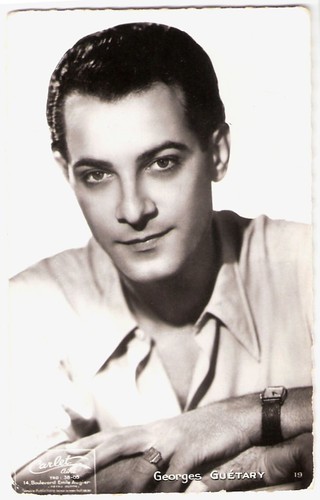
French postcard by Editions du Globe (E.D.U.G.), Paris, no. 19. Photo: Carlet Ainé.
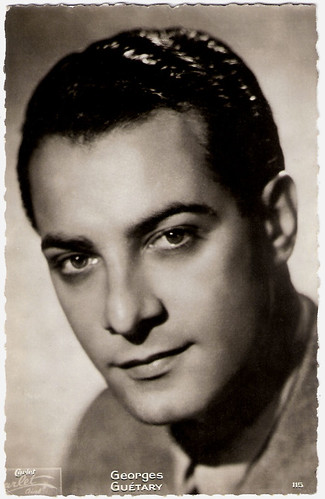
French postcard by Editions E. C., Paris, no. 115. Photo: Carlet Ainé.

Belgian postcard by Edition John Prevot, Anvers, no. 10. Photo: Disques Pathé.

French postcard by Edition d'Art BelFrance, Paris (EAP), no. 912. Photo: Sirius / Gaumont, Paris. Georges Guétary in Le Cavalier noir/The Black Cavalier (Gilles Grangier, 1945).
From the West End to Broadway to Hollywood
In 1947 Georges Guétary achieved acclaim on the London stage when he was imported from Paris by the impresario C. B. Cochran to star with Lizbeth Webb in the operetta 'Bless the Bride' at the Adelphi Theater.
He played the role of a handsome French actor who elopes with a young English girl on the day she is to marry someone else. The bride is parted from her husband by the Franco-Prussian War of 1870-1871 and believes him killed, but the lovers are reunited in time for the final curtain.
Praise for his performance led to offers from Broadway. In 1950, he made his debut at the 46th Street Theater, starring with Nanette Fabray in 'Arms and the Girl', a musical set in the days of the American Revolution.
Critic Brooks Atkinson wrote in The New York Times: “The part of her foreign-born suitor is played by Georges Guetary, who can act a character and sing a song with gusto, and make stage love in the Continental style, which has obvious advantages.”
This success paved the road to Hollywood, where he appeared in his best-known film, An American in Paris (Vincente Minnelli, 1951), built around the music of George Gershwin. He played Gene Kelly's rival for the affections of Leslie Caron. Guétary was the focus of attention in a spectacular scene in which he strutted up and down a majestic staircase singing 'I'll Build a Stairway to Paradise' while flanked by willowy and scantily (but flamboyantly) clad showgirls, and he shared the spotlight with Gene Kelly in a rousing rendition of '‘S Wonderful'.

French postcard by Edition d'Art BelFrance, Paris, no. 901. Photo: Sirius / Gaumont, Paris. Georges Guétary and Nicole Maurey in Le cavalier noir/The Black Cavalier (Gilles Grangier, 1945).
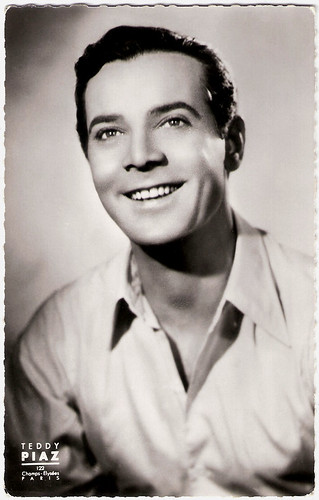
French postcard by Editions du Globe, Paris, no. 215. Photo: Teddy Piaz, Paris.

French postcard by Edition P.I., Paris, no. 29 K. Photo: Sam Lévin.

French postcard, no. 122. Photo: Teddy Piaz, Paris.
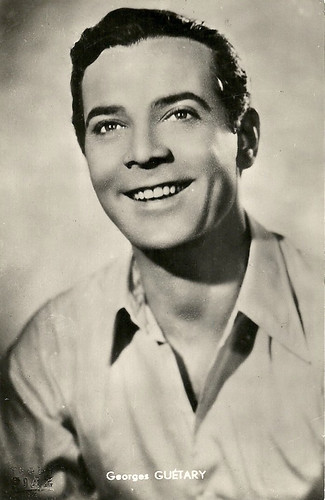
French postcard. Photo: Teddy Piaz.
A Latin lover with a voice of creme chantilly
In 1950 Georges Guétary returned to France and became a French citizen. In 1955, he married Jeanine Guyon, the only female French television producer. He starred in two enormously successful operettas by Francis Lopez, 'Pour Don Carlos' (420 performances at the Théâtre du Châtelet, the temple of operetta) and 'La Route fleurie' (The Flowery Path - four years at the ABC theatre) with comedian Bourvil and Annie Cordy.
Guétary starred in several more stage operettas, including 'Pacifico' (1958), 'La Polka des lampions' (1962), and 'Monsieur Carnaval' (1965), with music by Charles Aznavour. In 1981, Francis Lopez again asked Georges Guétary for a new operetta, 'Aventure à Monte-Carlo', which had an honourable success. After this, the two created more operettas like 'L'Amour à Tahiti' (1983), 'Carnaval aux Caraïbes' (1985) and 'Le Roi du Pacifique' (1986), but they couldn’t repeat their successes of the 1950s.
Guétary’s most popular recordings were 'Bambino', 'Papa Aime Maman' and 'La Samba Bresilienne'. He appeared in French, Spanish and German films, including Pluma al viento/Plume au vent/Feather in the Wind (Louis Cuny, Ramon Torrado, 1952), and Le Baron Tzigane/The Gypsy Baron (Arthur Maria Rabenalt, 1954) - an adaptation of the Johann Strauss operetta 'Der Zigeunerbaron'.
Le chemin du paradis/The Road To Paradise (Hans Wolff, Willi Forst, 1955) with Christine Carère was an alternate language version of Die Drei von der Tankstelle/The Three of the Gas Station (Hans Wolff, 1955). The two versions were a remake of the 1930 hit musical starring Lilian Harvey and Willy Fritsch. Guétary also sang and danced on television. 'The Eternal Young Man' continued to give some 40 gala performances a year until his retirement on the Riviera in 1995.
Georges Guétary died of a heart attack in 1997 in Mougins on the French Riviera. He was 82 and was survived by his wife and two children, director Hélène Guétary and actor François Guétary. In his obituary in The Independent, James Kirkup comes far while trying to capture Guétary's enduring appeal: "Part of Guetary's exotic charm, and much of his stage persona as a 'Latin lover' with a voice of Creme Chantilly resided in his mischievous innocence combined with an erotic mystery inherent in his ancestry. (...) The warm good-natured Guetary's teasing was always tender, and la Miss (Mistinguett) adored him, as did many of the ladies (and some of the gentlemen) who fell under his irresistible spell."
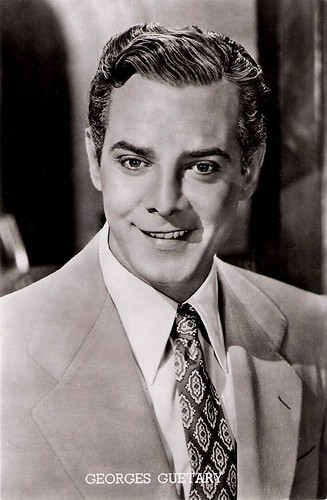
French postcard, no. 157.

French postcard by Imp. De Marchi Frères, Marseille.

French postcard by Editions P.I., Paris, no. 1099. Photo: Ektochrome Studeco. Georges Guétary and Jean Richard in the stage production of the operetta 'La Polka des lampions' (1961) by Marcel Achard at Théâtre du Châtelet in Paris, where it played 534 times.
Theatrical trailer An American In Paris (1951). Source: Astor Theatre (YouTube).
Georges Guétary sings 'Les enfants du Pirée'. Source: Avec Joie (YouTube).
Sources: Lawrence van Gelder (The New York Times), James Kirkup (The Independent), Wikipedia and IMDb.
This post was last updated on 20 July 2024.
No comments:
Post a Comment